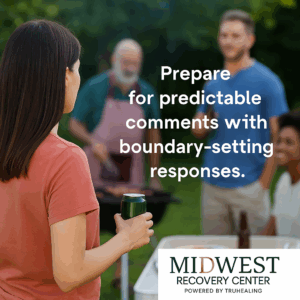Summer means sunshine, cookouts, music, and people you haven’t seen in a while. It also means questions. Sideways glances. Half-drunk opinions you didn’t ask for. And if someone you love is struggling with addiction, it means navigating all of that with a tight chest and a hopeful heart.
You don’t have to choose between honesty and harmony. You can talk about addiction—or not—on your terms. Here’s how to do it with clarity, boundaries, and care.
1. Speak from Compassion, Not Obligation
You do not owe anyone a full report. You are not your loved one’s press secretary. And you are not required to explain every decision you’ve made.
That said, people will ask. And you might want to say something—because you care, or because you want them to understand. When you speak, ground yourself in compassion rather than guilt.
Try this:
- “We’re going through something really hard, and we’re doing our best to support each other.”
- “They’re struggling. We see that. And we’re still showing up for them.”
These are simple, non-defensive ways to name reality without inviting shame or debate.
2. Shift the Energy Around Alcohol
Summer events are often drenched in booze. If you’re supporting someone in recovery—or hoping they might consider it—it helps to model something different.
You don’t need to make a grand announcement. Quiet decisions matter. Bring your own non-alcoholic drinks. Create space for conversations that don’t center on substances. Share a toast to something meaningful—without needing alcohol to do it.
This isn’t about controlling others. It’s about softening the environment so you and your loved one can breathe.
3. Anticipate the Hard Comments
Some people will say the wrong thing. They’ll ask if you’ve tried tough love. They’ll tell you what they’d do. Or they’ll minimize what you’re living with.
These moments are painful. And predictable.
Prepare for them. Practice a few boundary-setting responses like:
- “It’s not that simple, and we’re working with professionals who understand addiction.”
- “I appreciate your concern, but we’re focusing on support, not judgment.”
- “Thanks for caring. This is really hard, and we’re learning as we go.”
You don’t have to educate them. You just need to protect your peace.

4. Talk About Treatment—If It Helps
If someone asks what you’re doing to help, and you feel safe sharing, this might be a good time to talk about what treatment can look like.
You can say:
“We’re exploring options like an intensive outpatient program in Toledo. It allows someone to get real help while still staying connected to their life.”
Mentioning something specific like Midwest Recovery Center’s IOP might not change the conversation—but it might plant a seed. And if your loved one overhears? It shows that you’re informed, and hopeful.
5. Protect Your Energy, Not Just Your Image
People love to talk about boundaries—until you actually set one.
It’s okay to leave early. It’s okay to say no to a weekend trip, a family cookout, or a late-night conversation. It’s okay to answer, “I don’t want to talk about that right now.”
You’re not being dramatic. You’re being honest about what you can hold.
Remember, you’re allowed to love someone in active addiction and still choose moments of rest, distance, and joy for yourself.
Frequently Asked Questions
How do I explain my loved one’s absence without outing them?
Keep it simple and kind. Try: “They’re taking care of themselves right now.” or “They couldn’t make it, but we’re staying connected.”
What if someone brings up their substance use in front of others?
Redirect with empathy: “I know it’s complicated, and this probably isn’t the best time for that conversation.”
Should I avoid gatherings altogether?
Not necessarily. But if the environment feels harmful or exhausting, it’s okay to opt out. Choose spaces that respect your boundaries.
How can I help my loved one consider treatment like an IOP?
Lead with care, not confrontation. You might say: “I found a program that doesn’t require leaving everything behind. It’s structured, but still flexible. Would you want to look at it together?”
What if I feel like I’m carrying this alone?
You’re not. Consider joining a support group for families, or reaching out to a local program like Midwest Recovery Center to ask about family resources.
📞 Ready to Talk About Real Support?
If summer feels heavy this year, you’re not failing. You’re showing up with love in a world that doesn’t always understand what that takes.
Midwest Recovery Center offers an intensive outpatient program in Toledo that supports both individuals and their families. Flexible, respectful, and real.
Call (833) 657-0858. We’ll meet you where you are.
















